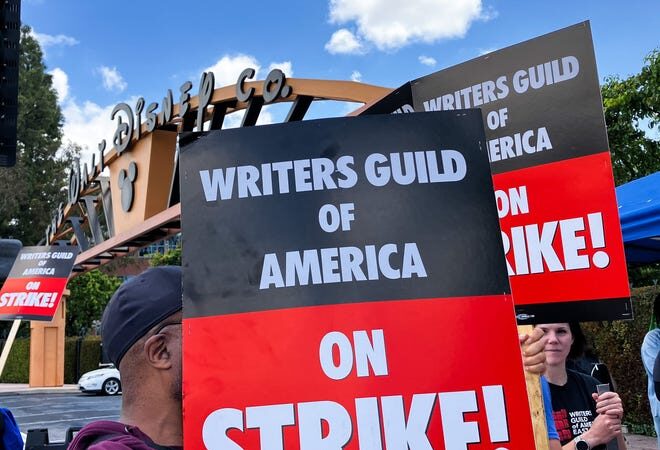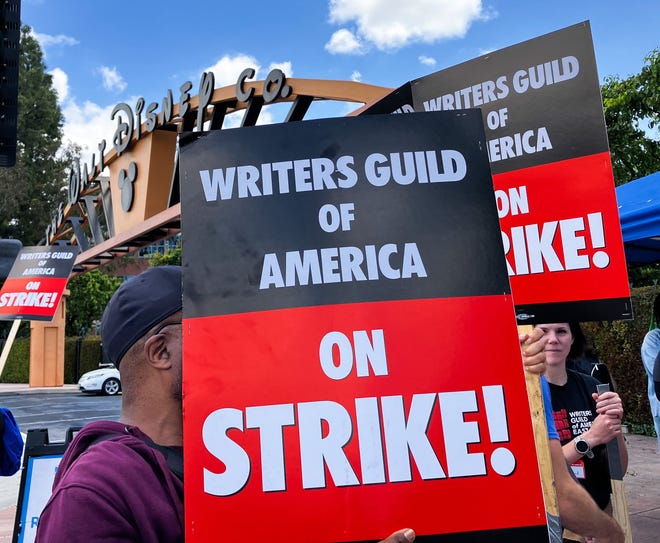
Screenwriters first went on strike in early May after talks between their union and employers collapsed, ultimately freezing production in Hollywood. The 11,500 screenwriters represented by WGA are joined by 160,000 actors also on strike. But it’s not just actors and writers on the picket line this summer: 3,000 workers went on strike at 150 Starbucks in June, and in July 6,000 Los Angeles hotel workers walked out over increased workloads with no pay bump.
From newsrooms to Amazon drivers, fast-food workers to actors, it seems that workers across major labor markets are striking or threatening to do so.
But how out-of-the-ordinary are these high-profile worker stoppages compared to previous years?
How often do strikes occur?
With less than half the year left, there have been 177 work stoppages, according to Bloomberg Law’s work stoppage database. That’s compared to the nearly 320 total strikes initiated by unions in 2022.
Last year proved to be monumental for strikers: It was the first time since 2005 strike totals surpassed the 300 mark.
But the number of strikes this year is not nearly as large as the labor activity seen prior to the 1990’s. The drop in labor action is due to a smaller share of workers represented by unions compared to the 1990’s and earlier.
Exclusive:Survey says movie and TV fans side with striking actors and writers

Is this the summer of strikes?
About 650,000 workers were expected to go on strike in the US this summer, including a whopping 340,000 UPS workers. Their union — the Teamsters — reached a deal before their expected strike on August 1, averting what could have been one of the largest strikes in US history.
The automotive industry’s labor union, the United Auto Workers, represents about 150,000 automotive workers at Detroit’s Big Three car companies (Ford, GM, and Stellantis). The UAW and Detroit’s Big Three are at the bargaining table, hashing out details for a new contract. The UAW initiated a strike in 2019 that lasted 40-days at GM factories.
Thousands of hotel workers in Southern California went on strike in July, calling for higher wages and better benefits. Their union—The Unite Here Local 11— say it’s the largest US strike in the industry’s history.
Hiring holds steady:187,000 jobs added in July as unemployment falls to 3.5%
Are strikes peaking in 2023?
The Bureau of Labor Statistics (BLS) tracks the number of workers involved in stoppages of 1,000 or more employees.
In 2022, 120,600 people were involved in a strike of 1,000 people or more. It’s unclear if this year’s strike activity will top 2018 or 2019 numbers.
While strikes are rising, the percentage of national workers represented by a union has declined for over a decade. About 10.1% of all workers are in a union as of 2022, the most recent data available from the BLS.
Writers strike 2023 explained:Why the WGA walked out, what it means for TV and film
When will the writers strike end?:Sides to meet for the first time in 3 months
Why are workers striking?
Many workers say conditions have worsened over the past three years, since the pandemic first began. With rising costs of living, pay has not kept up for frontline workers.
For writers, issues behind the strike include pay rates amid inflation, the use of smaller writing staffs for shorter seasons of television shows, and control over artificial intelligence in the screenwriting process.
When will the strike in Hollywood end?
The Writers Guild of America sent an email to members saying that the head of the Alliance of Motion Picture and Television Producers, which represents major studios, streaming services and production companies in negotiations, requested a meeting to discuss the resumption of contract talks.
It was not immediately known whether a similar overture was made to union leaders for Hollywood actors, who have been on strike since July 14.
“I had hoped that we would already have had some kind of conversations with the industry by now,” SAG-AFTRA Executive Director Duncan Crabtree-Ireland told The Associated Press earlier Tuesday, before the email was sent to writers. “Obviously, that hasn’t happened yet, but I’m optimistic.”






